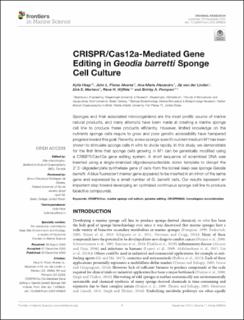CRISPR/Cas12a-mediated gene editing in Geodia barretti sponge cell culture
Hesp, Kylie; Alvarez, John L. Flores; Alexandru, Ana-Maria; van der Linden, Jip; Martens, Dirk E.; Wijffels, Rene Hubertus; Pomponi, Shirley A.
Peer reviewed, Journal article
Published version

Åpne
Permanent lenke
https://hdl.handle.net/11250/2730580Utgivelsesdato
2020Metadata
Vis full innførselSamlinger
Originalversjon
Hesp, K., Alvarez, J. L. F., Alexandru, A.-M., van der Linden, J., Martens, D. E., Wijffels, R. H. & Pomponi, S. A. (2020). CRISPR/Cas12a-mediated gene editing in Geodia barretti sponge cell culture. Frontiers in Marine Science, 7: 599825. doi: 10.3389/fmars.2020.599825Sammendrag
Sponges and their associated microorganisms are the most prolific source of marine natural products, and many attempts have been made at creating a marine sponge cell line to produce these products efficiently. However, limited knowledge on the nutrients sponge cells require to grow and poor genetic accessibility have hampered progress toward this goal. Recently, a new sponge-specific nutrient medium M1 has been shown to stimulate sponge cells in vitro to divide rapidly. In this study, we demonstrate for the first time that sponge cells growing in M1 can be genetically modified using a CRISPR/Cas12a gene editing system. A short sequence of scrambled DNA was inserted using a single-stranded oligodeoxynucleotide donor template to disrupt the 2′,5′-oligoadenylate synthetase gene of cells from the boreal deep-sea sponge Geodia barretti. A blue fluorescent marker gene appeared to be inserted in an intron of the same gene and expressed by a small number of G. barretti cells. Our results represent an important step toward developing an optimized continuous sponge cell line to produce bioactive compounds.
